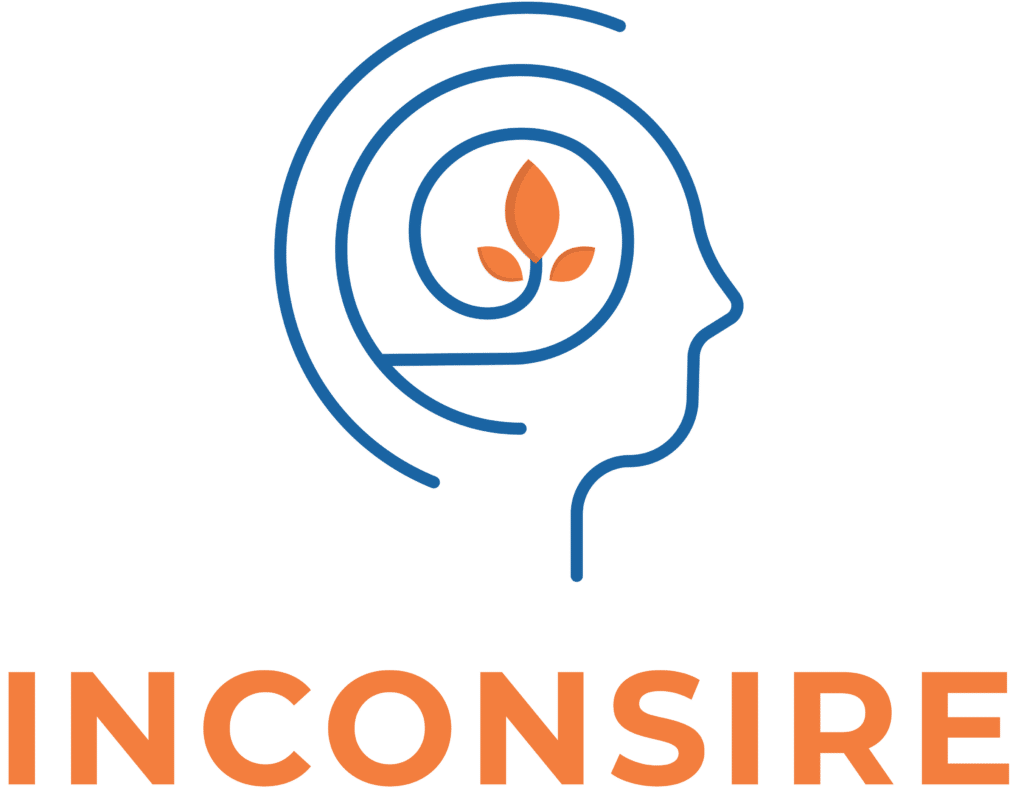How to establish well-being is a crucial question for everyone. It is a subjective concept and can be defined differently from person to person, depending on what motivates and brings meaning to an individual. At various points in life, we develop needs, dreams, and desires that we wish to fulfill. This happens multiple times throughout life, and the establishment of well-being helps us meet these aspirations. We might desire a specific job, want to live in a particular place, or aim to become a certain kind of person.
Well-being is established when all aspects of life are interconnected. These aspects, balanced across six sectors, form the foundation of well-being:
- Work: What, why, and how we do to earn a living.
- Economy: How we use our money.
- Social: How our social surroundings influence us.
- Environment: Physical surroundings and its impact.
- Health: How our body and mind is connected.
- Intelligence: How satisfied our mind is.
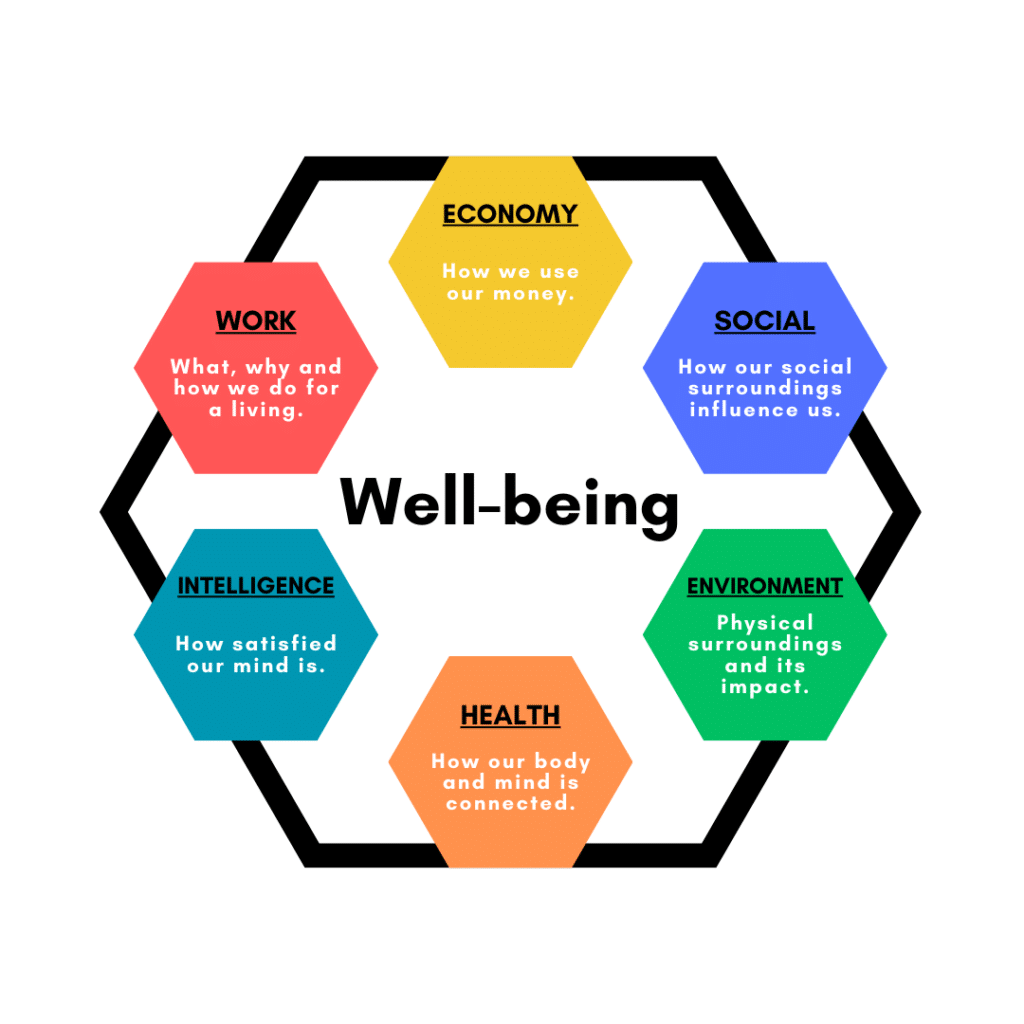
Well-being Creates Wholeness
Establishing well-being means creating a solid foundation and connection between all areas of life, forming a cohesive whole. We need to determine what is meaningful to us, what makes us happy, and establish a healthy relationship with all aspects that influence one another.
Not all sectors of our well-being need to carry equal weight. For example, we might care less about our environment than our social life, but we still need to establish a defined relationship with the various sectors. Sometimes, through our actions, we can impact more than one sector at once. For instance, if we enjoy our workplace, the tasks we perform, and our colleagues with whom we occasionally socialize outside work, we are addressing our work, environment, and social sectors simultaneously.
We don’t always have all sectors in mind. If we feel a certain disconnection from ourselves, it may be because our well-being is out of balance. Establishing well-being means defining each sector according to our own interpretation and determining how much each should matter in our lives. Let’s explore some considerations we might have for each sector.
Work
What we choose to do for a living becomes most effective when it feels meaningful to us in the moment. We need to understand and enjoy our work processes by providing our brain with enough to engage with. If you’re uncertain about what you’d like to do professionally, try to define what feels meaningful to you. It should fulfill a deeper purpose and be enjoyable to carry out. You can either find a company that helps you build the skills you want or start a business yourself.
Many workplaces now offer hybrid options. Having the flexibility to work in various ways can contribute to our well-being. We can arrange our working hours according to how and when we prefer to work. It’s also worth reflecting on how we realize ourselves through work. Should work take up a significant part of our lives? Should our lives revolve around it? Do we want a life that’s productive in terms of work?
Work now comes in many forms, but the reasons we work are crucial for our well-being.
Questions to Define Well-being in Our Work:
- How do I want to work?
- What kind of colleagues do I want?
- What am I good at?
- What do I enjoy doing?
- What do I find meaningful?
- How can I combine what brings me meaning and joy?
Working merely to survive is one thing, but we should also find a deeper purpose in it. Why? Because work contributes to our well-being. We don’t need lofty ambitions or to spend a third of our lives working, but figuring out how we want to contribute to the world is essential. Whether it’s working part-time to have time for friends and family or working full-time on something we love, the choice is ours. As long as our actions bring us joy and meaning, we are on the right path. Whether this is through something we associate with work or not, it’s the right direction.
Economy
When defining our financial needs, we can examine how we earn and spend money – essentially, our income and expenses.
For some of us, it can be challenging to see how our finances affect our well-being, as we often act based on immediate needs rather than rational thought. We want to enjoy what we buy now, but many of our purchases bring short-term joy rather than long-term satisfaction, which can negatively impact our well-being.
Consumerism has taken a strong hold on most people in society. We often buy things for self-centered reasons – to stand out, show off social status, etc. There are countless motivations behind our consumption, which we should become more conscious of by questioning whether what we buy truly benefits us.
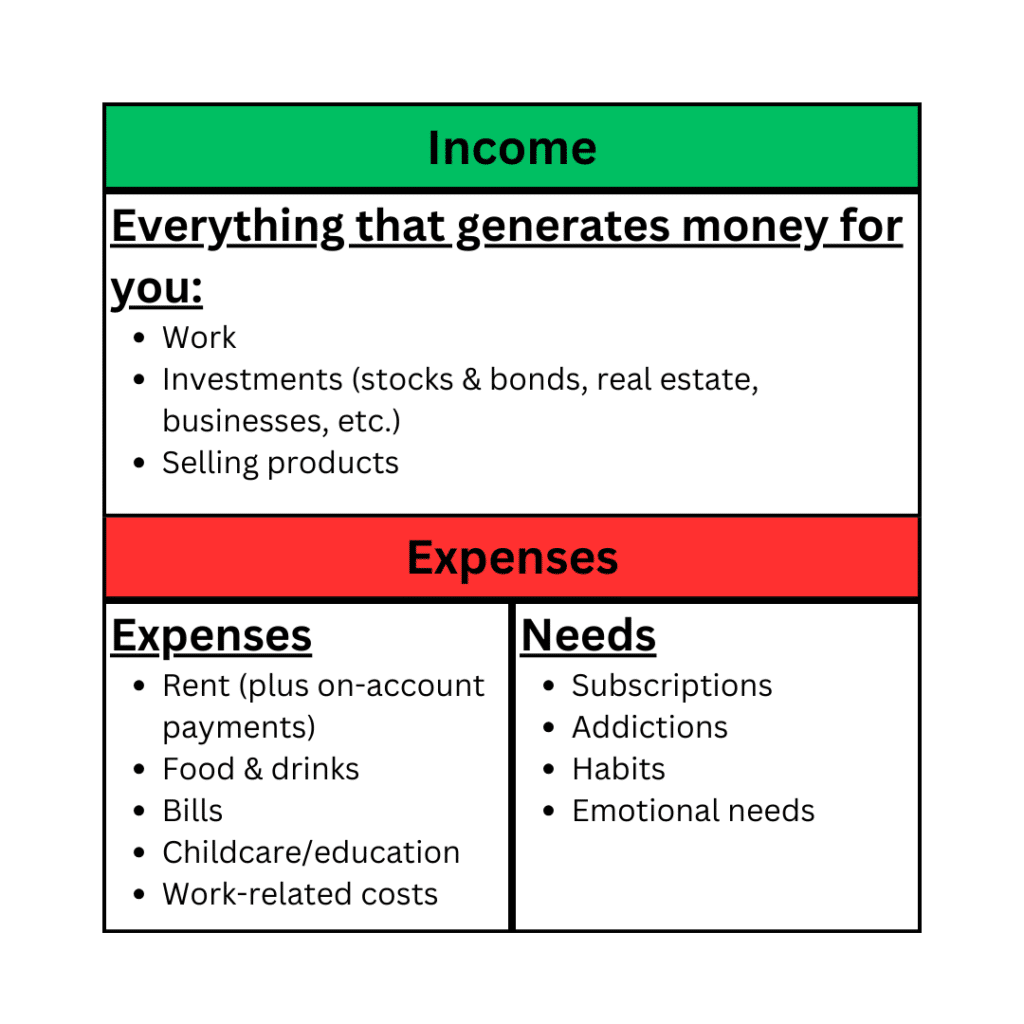
Economic Awareness
Creating financial awareness can benefit our well-being. When we do this, we can develop a healthier relationship with our purchases and recognize how they affect us—for example, by understanding overconsumption versus necessary purchases of goods and services. Do I really need to shop this week? And what need am I fulfilling by doing so? Figuring out what you truly need can save you a lot of money. At the same time, you can also start investing your money in the direction you want to grow. If you want to donate to an organization or invest in education, you’ll have the funds for it—or at least be able to save up for it. When we know our money is going toward something meaningful, we feel good about it.
Another way to build financial awareness is through investing. There are two ways to generate income: actively and passively.
Both types of income require an initial effort, but if you, for example, write a book or invest in companies, you need to roll up your sleeves before you can later enjoy the passive income that may come from the products you create or invest in.
Investing involves high risk. You can make a lot of money, but you can also lose a lot. Make sure you understand what investing entails before diving into it.
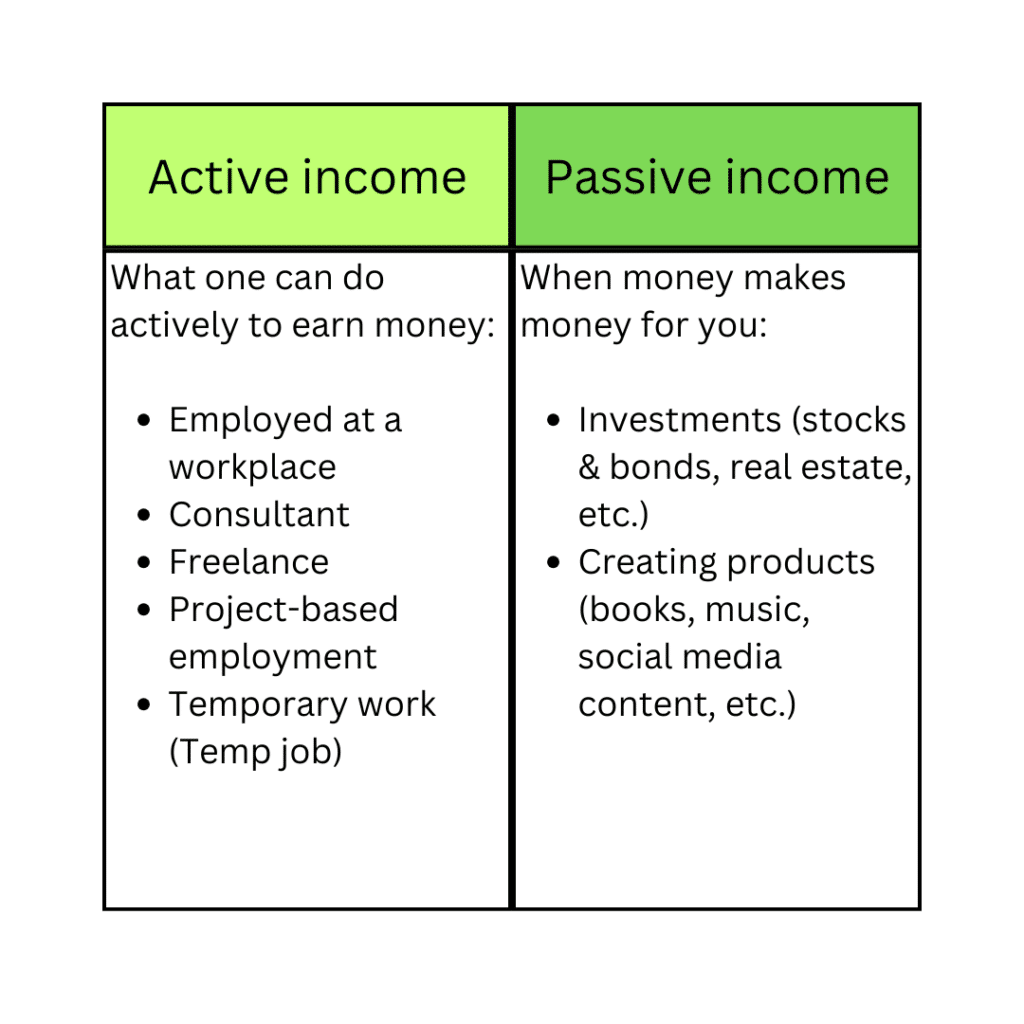
Questions to Define Our Financial Well-being:
- How do I want to earn money?
- How do I want to spend money?
- What kind of relationship do I want with my financial situation?
- What purchases affect me positively or negatively?
- What needs are most important for me to meet financially?
- How can I use my finances to influence other areas of my life?
Social
Humans depend on one another. For instance, we wear clothes made by people we’ll never meet, while our friends might compliment us on those clothes. We cannot live without others, and learning to resonate with people is a vital part of life. Even those who succeed in isolating themselves still rely on goods created by others. Therefore, we might as well learn to live in harmony with one another.
Surround yourself with people who bring out the best in you—those who communicate on the same wavelength and show care and compassion. Whether your social circle is large or small, ensure it consists of people with whom you resonate.
The social sector also encompasses improving social skills, such as how we respond to others’ behavior and interact with them. It challenges our understanding of empathy—whether we can connect with others and understand them by putting ourselves in their shoes. This involves everything from comprehending what someone says to interpreting their underlying meaning. The more we observe people’s behavior, including their tone, volume, pace, gestures, etc., the stronger our social skills become.
A common misunderstanding about relationships is that you don’t need many friends or a large family to be happy. Close friends and family are more important. Quality over quantity matters. Of course, meeting new people can be beneficial, and building new relationships takes time. Focus on one or a few people, rather than spreading yourself thin.
Questions to define our social well-being:
- Who do I want to surround myself with?
- What kind of friends do I want?
- How do I want to behave around others?
- How do my friends influence me, and do I want the impact I have on them?
- What is my attitude toward strangers?
- How can I make the most of my friendships?
Environment
When we talk about the environment, we refer to our physical surroundings and how they affect us. Reflect on the places you frequent and whether they meet your needs. Are you happy with where you are? Why or why not? The environment interacts with other sectors of well-being, influencing and contributing to our overall sense of balance. By questioning the needs we wish to fulfill through our physical surroundings—such as access to nature, urban opportunities, or a workplace with good indoor climate—we can enhance our well-being.
The environment is crucial to well-being. For example, you might enjoy your work but find the workplace environment incompatible with your working style. This could stem from a cultural disconnect or values at odds with your preferences, creating challenges in your desired work. Similarly, friendships may be deeply valued, but the setting—like a noisy festival—might be overwhelming and strain those relationships.
When there’s a mismatch between your environment and other sectors, explore unconventional ways to adapt the environment to align with your life. Adjust small details, such as remote work arrangements or picking up a new hobby, to create harmony.
Questions to define well-being in the environment:
- What kind of environments align with my other well-being sectors?
- How do I see myself in different environments in relation to my other well-being sectors?
- How do I want to feel, act, and behave in various environments?
- Which environments do I thrive in?
- Which environments might be exciting to explore that I haven’t experienced yet?
Health
Health is a broad concept in this context. While we often think of physical health, here it refers to both body and mind. It’s about how our body and mind connect with the physical world and how our actions contribute to both our physical and mental well-being.
We carry our bodies with us and exist only within ourselves, both physically and mentally. Therefore, understanding health is crucial. When we talk about health, we mean being present in our bodies—feeling them through our actions, environments, and sensations. This connection is achieved by uniting body and mind (our physical and mental processes) through mindfulness and presence.
To strengthen our health, we must connect body and mind by staying present. Each day, we interact with various environments, situations, and contexts to which our body and mind respond—whether through impulses, instincts, or conscious actions. Health is about feeling good physically and mentally while resonating with the circumstances we encounter.
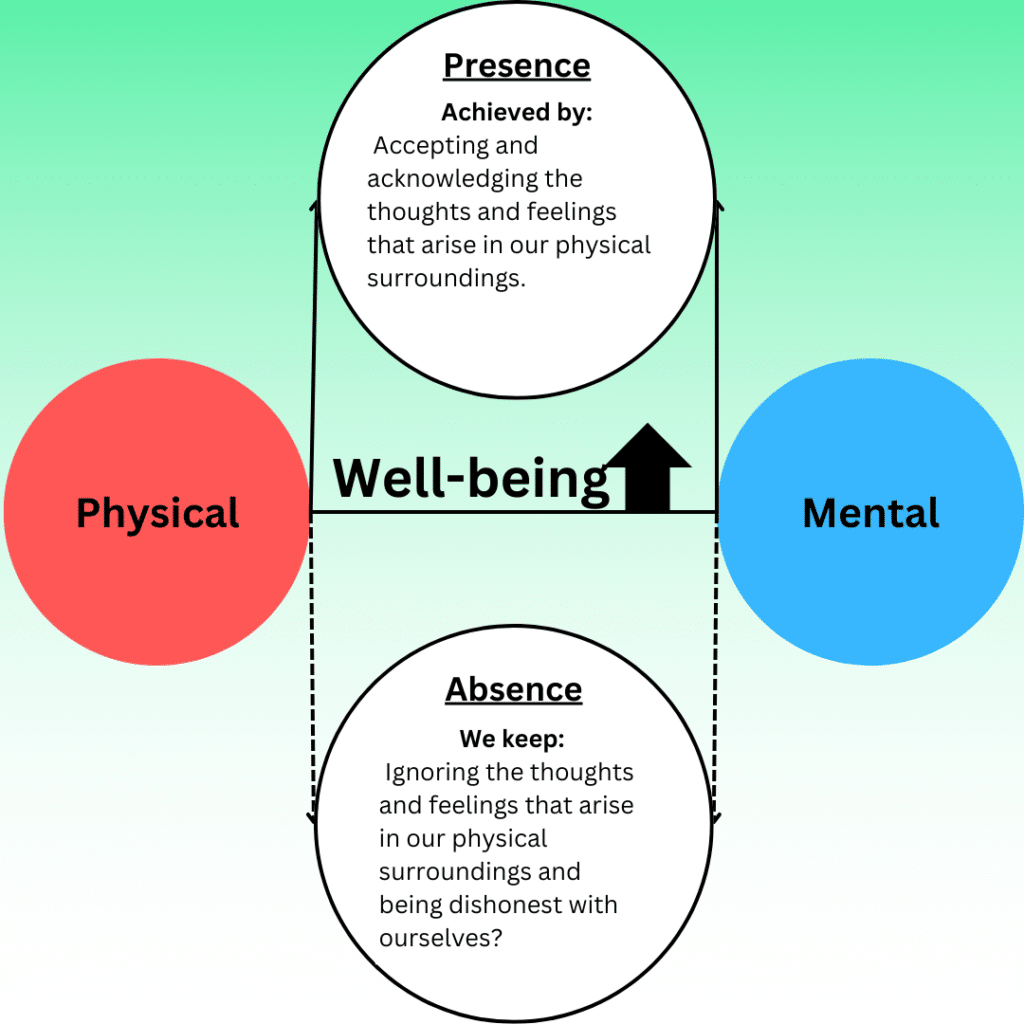
Health and Well-being
The more our body and mind are in sync, the easier it becomes to define other life sectors that create well-being. We feel the impact of these sectors through our physical and mental states, recognizing how they either motivate or demotivate us. It’s here that we sense the cohesion among the sectors. When our mentality and physicality align, we enter a state that strengthens our overall well-being, enabling us to harmonize all aspects of life—the ultimate goal of establishing well-being.
Life is divided into various sectors, as described earlier. We may feel good in most of these areas, but if one is out of balance, it can lead to stress and discomfort in both body and mind, evoking unpleasant thoughts and feelings. Regardless of where we are or how we feel, our first priority should be connecting body and mind. This involves finding calm where we are, accepting our circumstances, and acknowledging our situation.
If we neglect our physical and mental health, we cannot strengthen our well-being. Addressing how other sectors affect us is essential. For example, if we feel stressed about finances or struggle with social situations, we must manage these challenges by focusing on our health first. Before addressing financial or social well-being, prioritizing health is key because it helps us identify the root causes of our feelings and make adjustments without overhauling our lives unnecessarily.
Questions to Define Well-being and Health
- How do I want my mentality and physicality to affect me daily?
- What practices can I adopt to improve my mental and physical well-being?
- How can strong mental and physical health enhance my way of living?
- How do I feel the influence of other sectors on my health?
- How should my health feel in relation to other sectors?
- How can I connect other areas of my life into a cohesive whole?
- What brings joy and value to me?
- How do I feel in my body right now?
- What can I do right now to feel good in my body?
Intelligence
Intelligence involves gathering information and stimulating our minds to achieve satisfaction through our actions. It helps us understand how to use the knowledge we have to create value for ourselves and others. Intelligence is about building connections between the resources we possess and their potential to generate insights into various topics. To satisfy our minds, we need to find meaning in what we do. For instance, learning something new every day or understanding a particular situation can bring fulfillment to our minds.
Ultimately, intelligence is about challenging our intellect and developing coherent understanding. This can happen in many ways, such as engaging in physical activities, trying something new, or exploring familiar tasks in greater detail by focusing on nuances.
Intelligence and Well-being
The most important thing we can do for ourselves is to learn how to manage our thoughts and what they bring. If our minds are filled with too many thoughts, we struggle to concentrate, which leads to various negative consequences, such as reduced efficiency or a sense of unfulfillment at the end of the day. Being able to manage our thoughts is likely the first thing we should focus on if we want a well-functioning mind.
In the figure to the right, we see processes illustrating how a thought can influence our mind and how we can use awareness to change it.
By becoming aware of our thought processes—by accepting and acknowledging that our thoughts exist and understanding what they bring up in us—we will find it easier to manage them. Awareness helps us understand what our thoughts do, where they originate in our minds, and what actions we need to take to adjust our mental state in a way that benefits us.
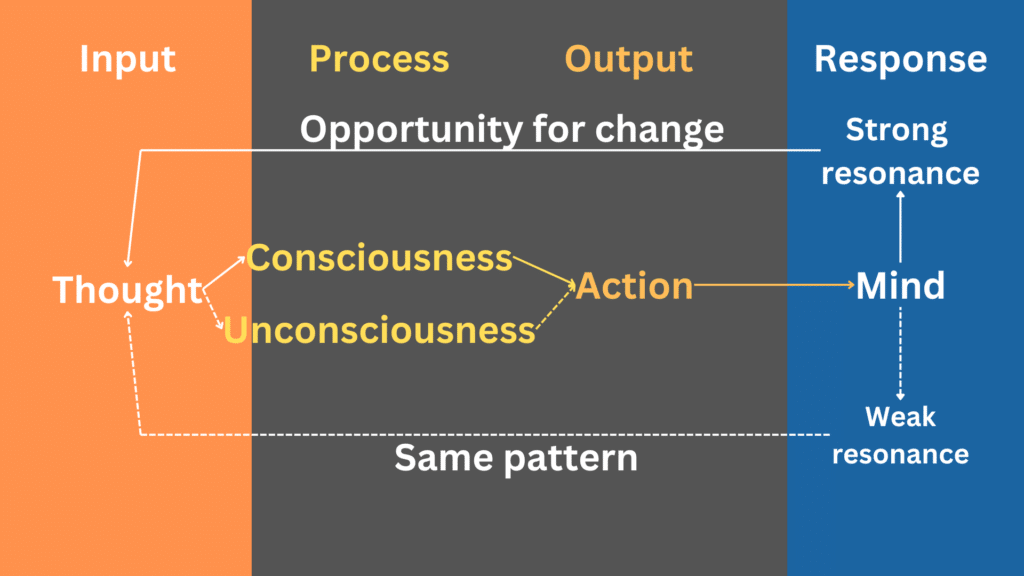
In this way, we can connect our well-being on an intellectual level by asking ourselves how we want to shape our own lives. Intelligence is about considering the future and recognizing what we would like to change in the present. When we are present and honest with ourselves, we fully utilize our intellect to make rational decisions that inspire us to take action for our own well-being. We integrate all the knowledge we have and create a foundation that supports us. The more knowledge we seek, the stronger our well-being becomes.
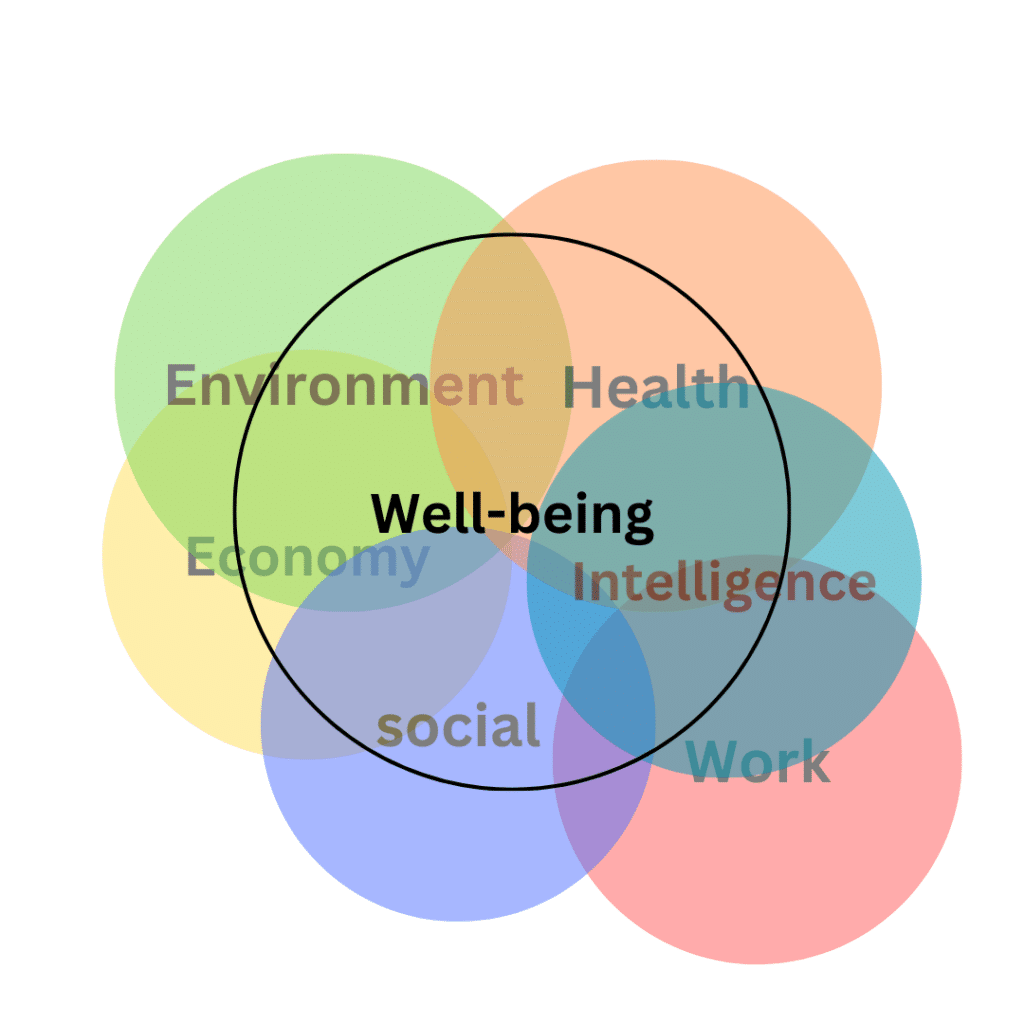
Questions to Define Intelligence and Well-being
- What can I do to manage my thoughts?
- How do my thoughts affect me?
- What is my perception and intention toward myself, others, and the world?
- How can I use the information I learn?
- How can I apply my knowledge to the world?
- How do I gather information for a specific purpose?
- What brings me into a state of flow?
- What do I love doing, even if it’s difficult and challenging?
- How do my other sectors connect and interact?
The Process of Establishing Well-being
The better we can connect the various sectors of our lives, the stronger our sense of well-being will be. It requires us to define these sectors from our unique perspective and assess whether they have the desired effect on us. As our needs and priorities evolve over time, adjusting the sectors helps maintain a healthy level of well-being. The goal is to cultivate a sense of meaning and happiness. If you’re unsure where to start, consider the following steps:
Be Adaptable
Humans are creatures of rhythm, thriving on routines and structured schedules. However, life often disrupts these rhythms. To stay aligned, we need adaptability—the ability to recognize and respond to changes in rhythm. This involves accepting that we can’t control everything but can manage what comes our way.
Stay Present
The present moment is the only place where we can actively respond to our well-being. While we can draw inspiration from the past or future, we must be grounded in the now to make meaningful changes. Presence sharpens our intuition, helping us identify what we want in the various sectors of our lives and enabling us to act accordingly.
Take Responsibility
Achieving well-being requires action, not just planning or dreaming. Taking responsibility means actively working toward our goals, even when faced with challenges. If we feel trapped, we have two options:
- Succumb to a victim mentality, which stifles progress.
- Adopt a constructive mindset, accept where we are, and strategize a path forward.
We can let go of responsibility and adopt a victim mentality, which doesn’t help us achieve anything—this mindset doesn’t allow us to take action. But if we develop constructive ways of thinking and take responsibility for where we are and how to move forward, our well-being can grow. Take responsibility and act based on what is happening right now and where you want to go.
For more information on responsibility: Click here
Listen to Intuition
When unsure about our desires across life’s sectors, intuition acts as a moral compass, guiding us toward fulfilling paths. We can activate intuition through:
- Mindfulness practices: Activities like meditation and visualization help us connect emotionally to actions we believe will bring joy.
- Active experiences: Experimenting with different environments, jobs, or hobbies can resonate with our inner compass.
However, intuition must be tempered with perseverance. Sometimes it nudges us away from unfamiliar situations before we’ve given them a chance. Overcoming initial resistance is key to discovering what truly aligns with our well-being.
Practice Productivity
When we talk about productivity, we talk about using our time as efficiently as possible to achieve the best results. In relation to well-being, it’s about aligning all aspects of life in a way that creates balance.
This doesn’t necessarily mean doing multiple things at once—quite the opposite. For example, imagine you have a weekend ahead where you’re attending a family birthday (social life) and also want to spend time on a hobby (intellectual growth). Instead of mixing the two—thinking about your hobby during the birthday and the birthday while engaging in your hobby—you allocate specific time for each, fully immersing yourself in the present moment. Before or after the birthday, you know you’ll focus on your hobby, but right now, you are present where you are.
Productivity is about presence—about making the most of what you’re doing in the moment. You can achieve this by setting aside dedicated time for each activity.
For more information on productivity: Click here
Step Out of Your Comfort Zone
When we feel a longing for something, it’s important that we act on it. It can be overwhelming to have thoughts and dreams we want to fulfill, but for the sake of our well-being, we need to act on our desires and step out of our comfort zone.
The first step is to change our mindset. If we struggle to understand why we should do something we don’t feel like doing or how to approach what we want, we need to rationalize our perspective.
For example, if we don’t understand the benefit of an exercise we’re doing in school, we can quickly lose the motivation to learn what the exercise is meant to teach us. The exercise might cause frustration because we don’t see its purpose. But if we realize that its goal is to introduce us to a new topic that enhances our understanding of the world, then it suddenly makes sense to engage with it.
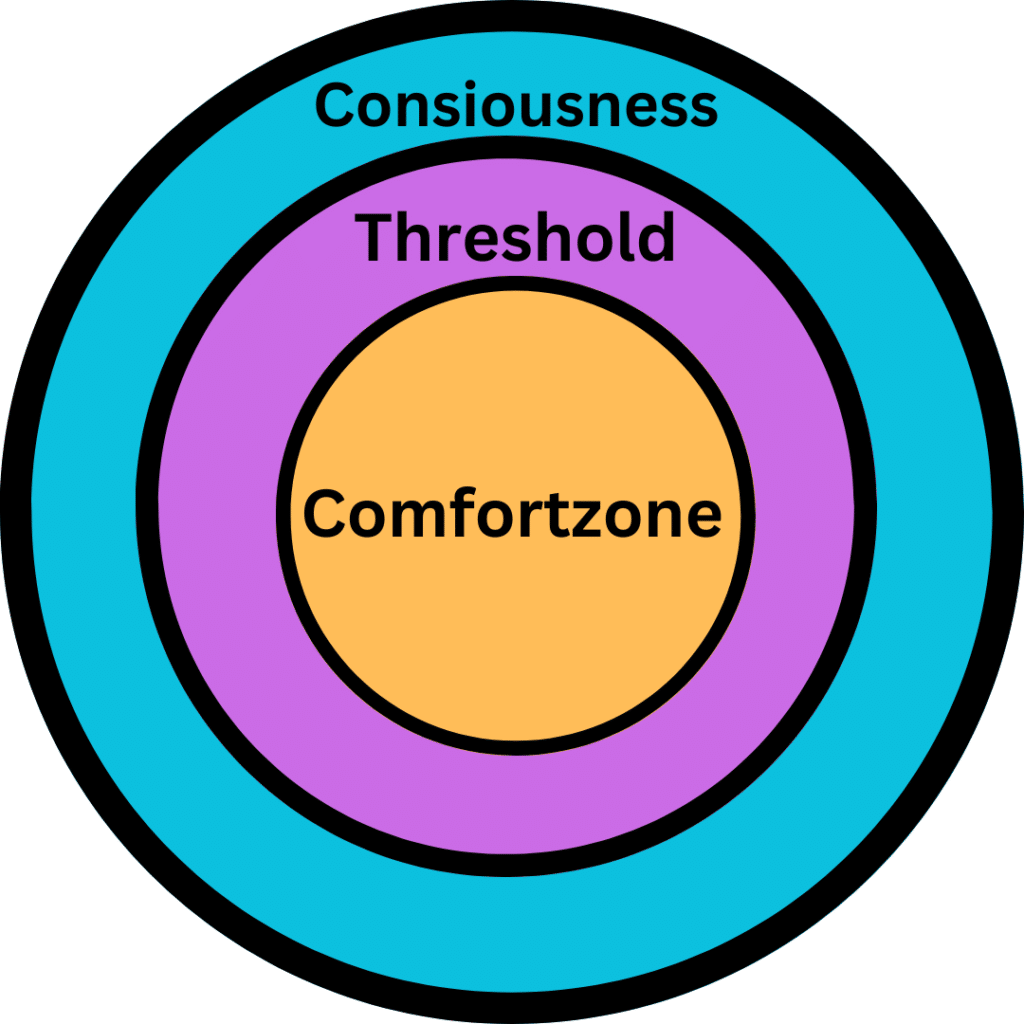
Stepping out of our comfort zone becomes easier the more we expose ourselves to it. Sometimes, it can be done gradually, while other times, we simply need to cross the line. Our mindset toward stepping out of our comfort zone is also crucial. We might face strong internal resistance that holds us back, and at other times, we may want to take the step, but our psyche struggles to accept it. As long as we rationalize our reasons and act based on them rather than on our emotions, we will break free from our comfort zone.
Handle Setbacks
Setbacks are an inevitable part of life. People aren’t perfect, which means failure is part of our nature. Setbacks can happen in many areas of life and may be physical, mental, or emotional. Here are some ways to approach setbacks:
Expect and Accept Them: Setbacks are a natural part of life. It’s important to understand that they happen to everyone at some point. Accept them as part of the process rather than as permanent barriers.
Learn from Them: Treat setbacks as opportunities to learn. Reflect on what caused them and explore how to do things differently in the future to avoid or better handle similar situations.
Seek Support: If a setback feels particularly overwhelming, reach out to friends, family, or professionals. Talking about your experiences can lighten the load and help you process the situation constructively.
Practice Self-Care: Give yourself time to recover. Strengthen your well-being by engaging in healthy habits like regular exercise, nutritious eating, quality sleep, and mindfulness practices like meditation.
Set Realistic Expectations: Be honest with yourself about what you can achieve. Setting attainable goals reduces the likelihood of setbacks and makes it easier to bounce back when they occur.
Focus on Solutions: Instead of fixating on the problem, direct your energy toward finding solutions. Identify actionable steps you can take and work on implementing them.
Keep Perspective: Remember that setbacks are temporary and do not define your worth or success. Stay hopeful and trust that things can and will improve over time.
Avoid Personalizing Failure: When setbacks occur, avoid labeling yourself as a failure. Failing doesn’t reflect your character—it’s about learning and growing. By separating the event from your identity, you give yourself room to improve.
Be Mindful of the Ego
Our reasons for taking action can be intuitive, conscious, or ego-driven. The ego questions our motivation, self-worth, and how we perceive ourselves. If we base our well-being on unhealthy ego-driven reasons—such as impressing others or feeling superior or inferior to them—we may end up harming our well-being. However, if our reasons are healthy, like helping others and spreading joy, we can improve our overall state.
It’s important to be aware of whether our actions are strongly influenced by the healthy or unhealthy tendencies of our ego. Our actions always have something to do with ourselves. No matter how altruistic or selfish we may act, there is always an element that involves us.
For example, donating to charity—an inherently kind act—can stem from a healthy ego-driven tendency, such as saying, “This organization supports a cause I believe should be highlighted.” Acting based on our beliefs is not wrong, as long as our intentions are good-hearted and we recognize how our own interests play a role in our actions.
For more information on ego: Click here
Build Morals and Principles
Morals and principles form the foundation for how we can create well-being. If you don’t currently follow any specific morals and principles or aren’t consciously aware of them, it might be a good idea to start by making a list. A solid set of moral and principled guidelines can give us reasons to act responsibly by making intentional decisions based on the belief systems we wish to live by.
Principles are fundamental rules or norms that some people consciously follow regarding attitudes or behavior in specific contexts. These can be supported by morals, which relate to perceptions of what is right or wrong, good or bad—especially according to a particular individual’s or group’s value system, such as responsibility, compassion, forgiveness, and empathy.
Here are a few examples of morals and principles:
- Take responsibility for your actions.
- Forgive yourself and others for their behavior.
- Be grateful for what you have.
These moral and principled frameworks help us shape the way we want to live. They provide an understanding of how we can strengthen ourselves through powerful mantras that serve as the foundation for our well-being..
For more information on morals and principles: Click here
Ask Questions
Questions lead to answers, which in turn elevate our awareness. Questions have the power to change our behavior, habits, and productivity, ultimately supporting our overall well-being. The better we become at asking questions, the better we can define the life we want to live.
Questions create possibilities, whereas statements do not. If we tell ourselves that we are bad at something (a statement), there isn’t much room for change. However, if we ask how we can improve, we open the door to growth. Humans have the ability to evolve and improve in whatever they set their minds to, and questioning our existence and abilities can be essential to our well-being.
Conclusion on Well-being
Well-being is essential for living a happy and healthy life. It provides us with a sense of purpose and joy by harmonizing the different sectors of our lives. There is no universal manual for achieving well-being; it is a subjective journey that evolves over time. Through well-being, we can explore new adventures, test ourselves in different fields, and grow as individuals. It helps us understand how we wish to live and offers a framework for creating a life filled with meaning and happiness.
A Foundation for Purpose
Well-being builds a strong sense of purpose. When we define and connect the various sectors of our lives, our purpose becomes clearer and more integrated into our daily routines. This clarity fosters motivation and a deeper sense of presence in our actions. We become more intentional in what we do, understanding why each action contributes to our overall well-being.
For more information on purpose: Click here
Improved Health
Both mental and physical health benefit from the integration of life’s sectors. Well-being helps us recognize how our health should align with our desires and purpose. By noticing how our actions resonate with our body and mind, we gain better control over our mental and physical processes. This awareness enables us to influence our health positively and achieve a state of flourishing.
Enhanced Emotional Intelligence
Well-being combines emotions and intelligence, connecting thoughts with the outcomes they produce—our feelings. It raises awareness of how our emotions and intellect interact, helping us understand what we feel, why we feel it, and how those feelings impact us. Emotional intelligence involves recognizing and leveraging emotions for our benefit. Well-being supports this by providing a rational framework to stabilize our emotional lives, helping us acknowledge and utilize our feelings constructively.
For more information on emotional intelligence: Click here
